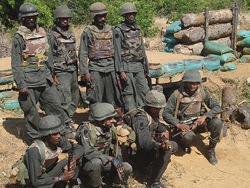 The decades-long civil war in Sri Lanka ended more than a year ago, but emergency powers are still in place, sending the wrong message, Amnesty International says.
The decades-long civil war in Sri Lanka ended more than a year ago, but emergency powers are still in place, sending the wrong message, Amnesty International says.
"With the Sri Lankan military’s defeat of the LTTE [Liberation Tigers of Tamil Eelam] as a military force there were high hopes and every reason to expect a loosening of some of the highly restrictive laws and abusive practices that had characterized life in Sri Lanka for the past years," Sam Zarifi, Asia-Pacific director for Amnesty International, told IRIN by email from London. "Unfortunately that has yet to materialize.
"Continued reliance [on emergency regulations] when there is no longer evidence of an emergency… sends a message to Sri Lankan citizens that the state does not respect the rule of law," Zarifi said.
However, Rajiva Wijesinha, a member of parliament, defended the state of emergency, saying the government had maintained such measures since its defeat of the Tigers in May 2009 because of the concern that former cadres might "reactivate" with support from abroad.
Wijesinha said that while Amnesty’s accusations were unwarranted, he recognized room for improvement. "We are aware that torture and other violations do occur, which is why we are trying to improve training for the police, as was done consistently with the army."
Expectations for reconciliation and rehabilitation are strong since fighting ended.
The Sri Lankan government has set up a truth and reconciliation commission to investigate events in the final years of the civil war, from February 2002 to May 2009. Tens of thousands of people are estimated to have died since the conflict began in 1983, according to government figures. Both sides are accused of human rights abuses.
(For updates you can share with your friends, follow TNN on Facebook and Twitter )
